Two-Lane Blacktop Blu-ray Movie
HomeTwo-Lane Blacktop Blu-ray Movie 
Criterion | 1971 | 103 min | Not rated | Jan 08, 2013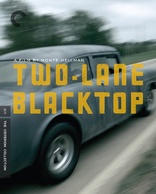
Movie rating
7.5 | / 10 |
Blu-ray rating
| Users | 4.5 | |
| Reviewer | 4.5 | |
| Overall | 4.5 |
Overview
Two-Lane Blacktop (1971)
A mechanic and a driver live only to race and maintain their 1955 Chevy. Heading east from California with no particular agenda, they give a girl a ride, and en route she incites jealousy between the men by sleeping with them both. Meanwhile, the trio encounters an overbearing GTO driver who agrees to race them to New York, each side putting at stake their most prized possession: their car.
Starring: James Taylor (I), Warren Oates, Laurie Bird, Dennis Wilson (I), Harry Dean StantonDirector: Monte Hellman
| Drama | 100% |
Specifications
Video
Video codec: MPEG-4 AVC
Video resolution: 1080p
Aspect ratio: 2.36:1
Original aspect ratio: 2.39:1
Audio
English: LPCM Mono (48kHz, 24-bit)
English: DTS-HD Master Audio 5.1 (48kHz, 24-bit)
Subtitles
English SDH
Discs
50GB Blu-ray Disc
Single disc (1 BD)
Playback
Region A (locked)
Review
Rating summary
| Movie | 5.0 | |
| Video | 4.0 | |
| Audio | 4.5 | |
| Extras | 5.0 | |
| Overall | 4.5 |
Two-Lane Blacktop Blu-ray Movie Review
Reviewed by Dr. Svet Atanasov December 9, 2012Monte Hellman's "Two-Lane Blacktop" (1971) arrives on Blu-ray courtesy of Criterion. The supplemental features on the disc include original trailer for the film; video piece in which director Monte Hellman revisits some of the film's key locations; video interview with director Monte Hellman and singer-songwriter-actor Kris Kristofferson; screen test outtakes and casting interviews discovered in director Monte Hellman's garage; video interview with director Monte Hellman and James Taylor; gallery of rare behind the scenes photos and publicity stills; audio commentary by director Monte Hellman and filmmaker Allison Anders; second audio commentary featuring screenwriter Rudy Wurlitzer and film professor and author David N. Meyer; and more. The release also arrives with an illustrated booklet featuring an essay by critic Kent Jones; appreciations by director Richard Linklater and musician Tom Waits ; and a reprint of the 1970 Rolling Stone article "On Route 66, Filming Two-Lane Blacktop" by Michael Goodwin. In English, with optional English SDH subtitles for the main feature. Region-A "locked".
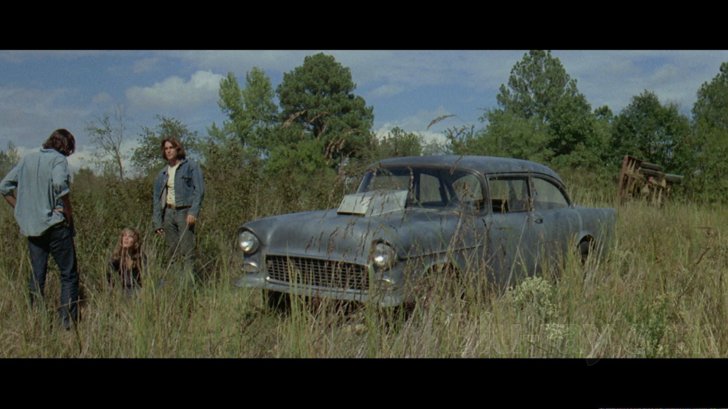
The Driver, the Girl and the Mechanic
They barely talk. The Driver (rock singer-songwriter James Taylor) drives their souped-up '55 Chevy while The Mechanic (the late Dennis Wilson from The Beach Boys), occasionally fixes things that need to be fixed. They don't stop unless they absolutely must - like when they have to eat, change tires, or buy gas. They are heading back East, to do something, somewhere.
A girl (Laurie Bird, Cockfighter, Annie Hall) quietly joins The Driver and The Mechanic, but they don't seem to care much about her. She is also heading somewhere. Occasionally they exchange a few words, but mostly when the girl tries really hard to have a conversation, usually a meaningless one.
At a gas station somewhere on Route 66, The Driver, The Mechanic and their passenger meet GTO (Warren Oates, Badlands, Bring Me the Head of Alfredo Garcia), a middle-aged man who may or may not have won his car in Las Vegas. They agree to race for each other's 'pink slips'. The first car to reach Washington D.C. wins the race.
The race begins but soon it becomes clear that no one really wants to win it. It also becomes clear that none of the racers are who they pretend to be. The tiny bits of information about their past that they occasionally share with the people they meet in bars and diners along Route 66 are always different.
The deeper the racers go into the South, the closer they become to one another. They help each other, speculate about the future, make love and get jealous. The Driver and The Mechanic also race other racers, for money, and the occasional naive cops, who have no idea that they can't be caught.
There is an obvious desire in Monte Hellman's Two-Lane Blacktop to imitate Dennis Hopper's legendary Easy Rider. The film is imbued with the same beautiful fluidity and poetic melancholy that made Hopper's film a sensation at the Cannes Film Festival. Its moody soundtrack also enhances the visuals in a familiar fashion, though it is hardly as influential as that of Easy Rider.
Even though the speed is different, the journey is also familiar. The country the racers are driving through is the same confused, suspicious, disoriented and ultimately extremely dangerous America where some Americans must look and act in a certain way in order to stay alive.
There is plenty of talk about cars and car problems, but the focus of attention is on other much more serious issues (alienation, rootlessness, and problems of identity). Yet this isn't a political film seeking to produce an important political message; rather it is a period film that offers the viewer the opportunity to feel the unique pulse of a strange era. Needless to say, neither the identities of the racers nor their journey and its end need to be overanalyzed.
Two-Lane Blacktop was shot on the Techniscope format (not anamorphic), which was preferred by many directors who had to work with limited budgets during the late '60s and early '70s. Because of its superior depth of field, the many nighttime sequences in the film look enormously sharp and well detailed despite being unusually dark. The framing - and close-ups in particular - is also handled with terrific precision.
The unusual, and for years very problematic, soundtrack features tracks by The Doors, Kris Kristofferson, Chuck Berry, and Arlo Guthrie.
Note: After a number of studios, including Columbia Pictures, Warner Brothers and MGM, showed little interest in Two-Lane Blacktop, director Hellman was eventually able to secure funding from Universal Studios. The film was made for approximately $875,000.
Two-Lane Blacktop Blu-ray Movie, Video Quality 
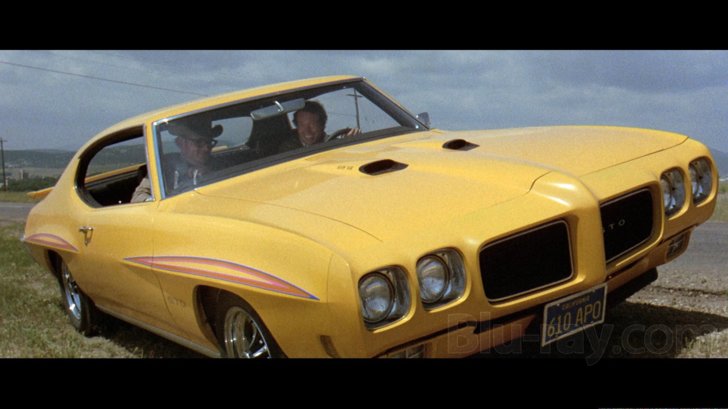
Presented in an aspect ratio of 2.36:1, encoded with MPEG-4 AVC and granted a 1080p transfer, Monte Hellman's Two-Lane Blacktop arrives on Blu-ray courtesy of Criterion.
The following text appears inside the booklet provided with this Blu-ray disc:
"Supervised by director Monte Hellman, this high-definition digital transfer was created on a Spirit 2K from a 35mm four-perforation interpositive made from the original Techniscope two-perforation camera negative. Thousands of instances of instances of dirt, debris, scratches, splices, warps, jitter, and flicker were manually removed using MTI's DRS and Pixel Farm's PFClean, while Image System's Phoenix was used for small dirt, grain, and noise reduction.
Transfer supervisors: Monte Hellman; Maria Palazzola.
Colorists: Doug Drake/Universal Studios, Los Angeles; Greg Garvin/Modern Videofilm, Los Angeles."
The restored high-definition transfer used for this release, which was supervised by director Monte Hellman, appears to have originated from the same source Eureka Entertainment had access to when they prepared their release of this cult American film. Criterion's high-definition transfer, however, is definitely more satisfying. Depth, in particular, is a lot better, both during close-ups and larger panoramic shots, due to the fact that the filtering corrections that could be spotted on the Eureka Entertainment release are not easy to see here. Definition is also marginally better, though it is obvious to me that the master from which the transfer was struck actually has its limitations (compare screencapture #2 with screencapture #1 from the Eureka Entertainment release). Furthermore, some light noise is present here, but I think that it is preferable to the flatter and filtered image (compare screencapture #19 with screencapture #3 from the Eureka Entertainment release). Color reproduction is decent, but during some of the daylight sequences it becomes obvious that color saturation could be better. Edge-enhancement is not a serious issue of concern. Also, there are no large debris, damage marks, warps, and stains. All in all, Criterion's presentation of Two-Lane Blacktop is clearly superior, as it boasts a more convincing organic look, but it is obvious to me that in certain areas there is still some room for improvement. This being said, I doubt a better release of Two-Lane Blacktop will emerge somewhere else so this should be the one to invest in. (Note: This is a Region-A "locked" Blu-ray disc. Therefore, you must have a native Region-A or Region-Free PS3 or SA in order to access its content).
Two-Lane Blacktop Blu-ray Movie, Audio Quality 
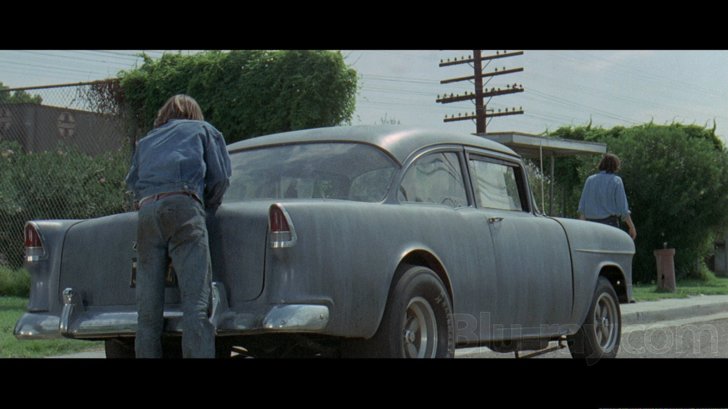
There are two audio tracks on this Blu-ray disc: English LPCM 1.0 and English DTS-HD Master Audio 5.1. For the record, Criterion have provided optional English SDH subtitles for the main feature. When turned on, they appear inside the image frame.
Dynamic movement is definitely better on the supervised by director Monte Hellman 5.1 track. During the racing sequences, in particular, depth is clearly better. During the rest of the film, however, there are mostly random nature sounds and noises, so do not expect to hear any dramatic improvements in dynamic intensity or substantial surround effects. The dialog is crisp, clean, stable, and easy to follow. I personally prefer to view this film with the original mono track, which in my opinion also opens up the film quite well.
Two-Lane Blacktop Blu-ray Movie, Special Features and Extras 
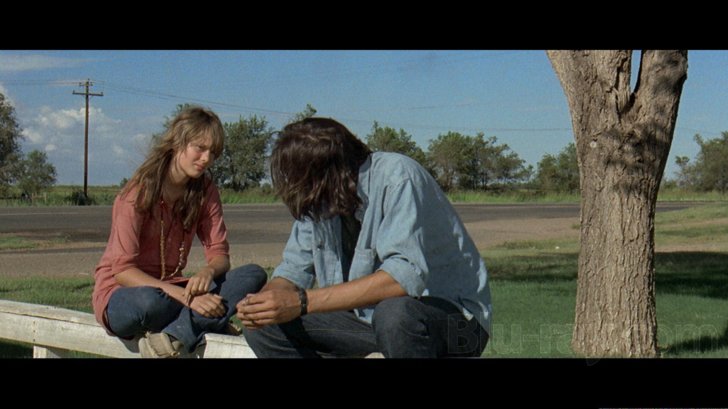
- Trailer - original trailer for Two-Lane Blacktop. In English, not subtitled. (3 min, 1080i).
- On the Road Again - accompanied by a few of his students and revisiting locations from Two-Lane Blacktop, director Monte Hellman recalls how the film came to exist, how Universal Studios funded and promoted it, where and how specific sequences from the film were shot, etc. In English, not subtitled. (43 min, 1080i).
- Make It Three Yards - in this video interview, director Monte Hellman and James Taylor recall their work on Two-Lane Blacktop, the production and shooting processes, some of the technical obstacles that had to be overcome, etc. James Taylor also explains why he never saw the finished film. The interview was recorded in the Fall of 2007 in Massachusetts. In English, not subtitled. (39 min, 1080i).
- Somewhere Near Salinas - director Monte Hellman and singer-songwriter-actor Kris Kristofferson recall their encounter before shooting of Two-Lane Blacktop began. (Kris Kristofferson contributed to the soundtrack and was also considered to play one of the main protagonists in the film). The interview was filmed in Los Angeles in the summer of 2007. In English, not subtitled. (28 min, 1080i).
- Sure Did Talk To You - in this featurette, producer Michael Laughlin, production manager Walter Goblenz, Jared Hellman, Steven Gaydos of Variety magazine, and filmmaker Dennis Bartok discuss the production history of Two-Lane Blacktop. The featurette was filmed in Los Angeles in the summer of 2007. In English, not subtitled. (24 min, 1080i).
- Those Satisfactions Are Permanent - screen test outtakes and casting interviews discovered in director Monte Hellman's garage in 2007. The casting interviews are conducted by A.J. Solari, who plays the discontented and edgy Tennessee hitchhiker in the film. In English, not subtitled.
1. Laurie Bird - (15 min, 1080p).
2. James Taylor - (11 min, 1080p).
- Color Me Gone - a gallery of rare behind the scenes photos and publicity stills from Two-Lane Blacktop. (Color and black and white stills). (1080p).
- Performance and Image - a collection of photos with one of the three '55 Chevys used in Two-Lane Blacktoop. The car was located by car enthusiast Walt Bailey, who also restored it with the assistance of Richard Ruth. Also included are excellent text descriptions of the restoration process. (1080p).
- Commentary - Monte Hellman and filmmaker Allison Anders (Four Rooms, Things Behind the Sun) discuss the production history and unique qualities of Two-Lane Blacktop. The commentary was recorded for Criterion in 2007.
- Commentary - a second audio commentary featuring screenwriter Rudy Wurlitzer and film professor and author David N. Meyer. The commentary was recorded for Criterion in New York City in 2007.
- Booklet - an illustrated booklet featuring an essay by critic Kent Jones; appreciations by director Richard Linklater (Dazed and Confused, Before Sunrise) and musician Tom Waits (Down by Law); and a reprint of the 1970 Rolling Stone article "On Route 66, Filming Two-Lane Blacktop" by Michael Goodwin.
Two-Lane Blacktop Blu-ray Movie, Overall Score and Recommendation 
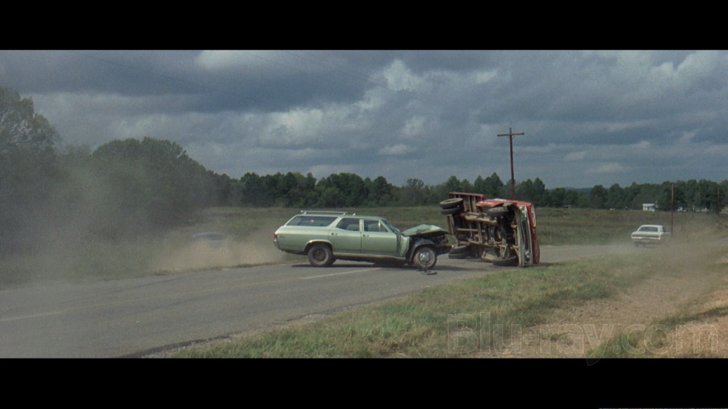
I think that director Monte Hellman's Two-Lane Blacktop is an essential film to own. It is a beautiful, very atmospheric time capsule that is rightfully considered by many as one of the greatest American films from the 1970s. Criterion's Blu-ray release of Two-Lane Blacktop is undoubtedly the best all-around package currently on the market. HIGHLY RECOMMENDED.
Similar titles
Similar titles you might also like

Easy Rider
1969

Paris, Texas 4K
1984

Five Easy Pieces
1970

The Last Detail 4K
Shout Select
1973

The King of Marvin Gardens
1972

Vanishing Point
1971

Medium Cool
1969

Scarecrow
1973

Higher Ground
2011

Flashbacks of a Fool
2008

If....
1968

Sunday Bloody Sunday
1971

The Seventh Seal 4K
Det sjunde inseglet
1957

Breezy
1973

Wake in Fright
1971

Inside Llewyn Davis
2013

The Swimmer
Deluxe Edition
1968

Kumiko, the Treasure Hunter
2014

Grand Prix
1966

The Ice Storm
1997